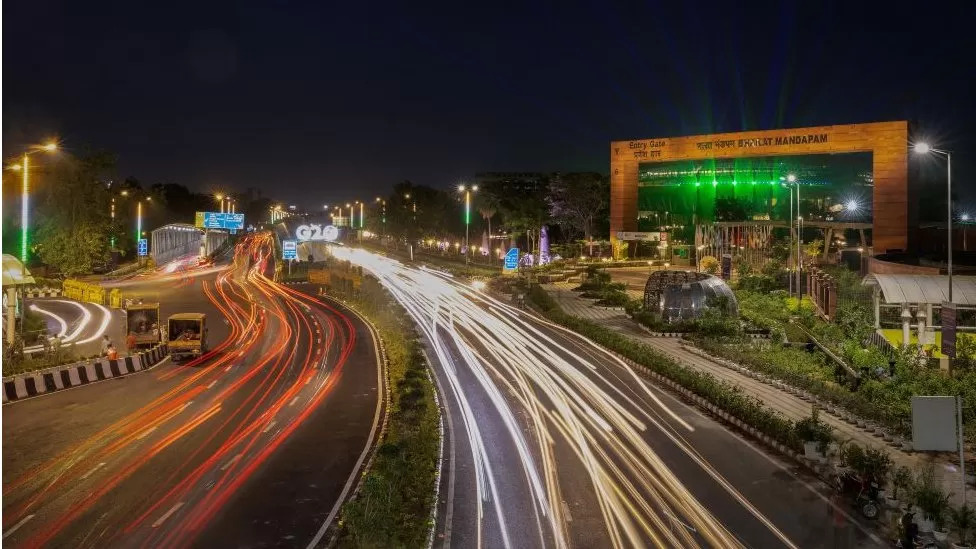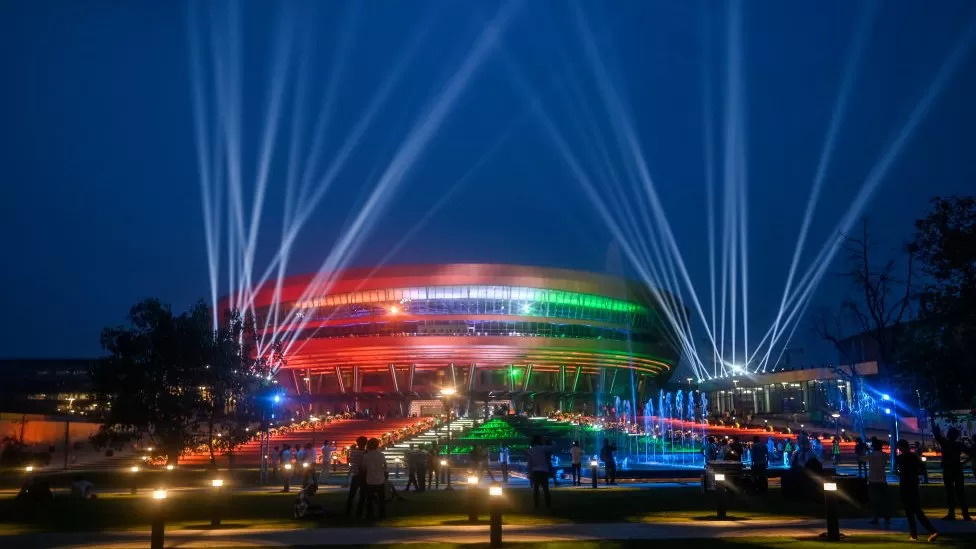On any given day, strolling down an Indian street, you will encounter billboards featuring Bollywood stars endorsing various products.
But over the past year, posters for the G20 summit have cropped up in every corner of the country. They are taped to electricity poles and stuck behind tuk-tuks, and have been showcased on massive LED screens.
The posters prominently display India’s official G20 logo, featuring a globe nestled within a blossoming lotus – a design that has drawn comparisons with the symbol of the governing Bharatiya Janata Party (BJP). Accompanying them are photos of Prime Minister Narendra Modi.
The message that the government wants to send is that India has arrived on the world stage.
With a reported budget for hosting the G20 exceeding $100m (£78m), the country has held 200 pre-summit meetings in more than 50 cities featuring yoga, cultural performances and specially curated menus.
For months, there’s been dizzying coverage of events on Indian news channels, aimed at tempting even those usually impervious to the nuances of foreign policy.
Now, with the main summit just two days away, the capital Delhi has been spruced up for what is being called the most high-profile event to be held in India in years.
Sculpted fountains, flower pots and the Indian flag have been installed around the city. Dozens of historical monuments have been lit up with the summit logo and people are flocking to click selfies. The city’s famed gardens have received a facelift, their foliage freshly pruned, and flags of participating nations put up.
But there is another side to the beautification drive. Temporary cloth walls have been erected in front of many slums to hide them from view and, in some cases, residents have been relocated. Beggars have been evicted from the heart of the city – it’s not clear where they have been moved to.

The government has declared three days of holiday for most schools and offices, shut crucial roads and deployed thousands of security personnel ahead of the event. Hundreds of flights and trains have been cancelled.
India has never hosted so many world leaders at the same time.
“India is trying to blur the line between foreign affairs and domestic politics, and the G20 is the most important forum to achieve that. The government realises that,” says Jitendra Nath Misra, a former Indian ambassador.
But even with the carnival-like atmosphere, Delhi will have the delicate task of ensuring that issues like the Ukraine war – which caused deep divisions within the group at last year’s G20 summit in Bali – do not derail its ambitions.
“India will hope the focus will be on agreeable issues rather than divisive ones like Ukraine. It hasn’t been able to do that so far but it will want to look better now,” Mr Misra says.
Since assuming the G20 presidency, India has said it wants to put issues that disproportionately affect developing countries – climate change, the increasing debt burden on developing nations, digital transformation, rising inflation, and food and energy security – on the agenda.

The summit comes at a time when the “Global South” has managed to assert itself as a major stakeholder in the international order and Western countries have realised that “their exclusive clubs cannot alone solve the problems of the world”, says Happymon Jacob, a professor of foreign policy at Delhi’s Jawaharlal Nehru University.
With growing inequality, high food and fuel prices, and climate change, many countries now question the relevance of a forum dominated by the West like the G20, which they claim is focused on an outdated global distribution of power.

Mr Jacob says this was most evident during the pandemic, when India helped countries in Africa, South Asia and even China, “while the Western countries were only looking after themselves”.
Going forward, there needs to be “a converging point” between the two sides of the world – and India is hoping to offer that at the summit.
“The message to the domestic population and the Global South is that we are with you and we are willing to lead from the front. And to the international community, it’s that you cannot afford to ignore the concerns coming from this part of the world under India’s leadership,” Mr Jacob adds.
For instance, Mr Misra says, the proposal to include the African Union in the G20 reflects India’s willingness to support developing countries.
With India being one of the bright economic spots in the world, it also feels it has the heft and the means to achieve this.
But trying to become a potential bridge between the developed and the developing world is not going to be easy for the government in Delhi, which continues to be in a delicate position geopolitically.
It will also be under pressure to deliver results domestically, given how much it has invested in promoting a G20 summit under Mr Modi’s leadership. He will want to show that he has been able to make India’s position stronger in the world, especially in the run-up to next year’s general election.

Traditionally, foreign policy doesn’t play a big role in Indian electoral politics unless it’s about the immediate neighbourhood – such as Pakistan or China – or the US in recent years.
But that is changing under Mr Modi – Indians are aspirational, they care about their image in the world and so does Mr Modi.
“He has positioned himself as a global statesman. A big and successful show at the G20 would add to that image,” Mr Jacob says.
Mr Misra adds that even if the summit is jarred by Ukraine, people would “look at the summit as an event that has bolstered India’s international stature”.
But there is a lot of work to do at home for Mr Modi – creating jobs for millions of people, for example.
Then there are questions around human rights. Opposition parties and activists say there has been a surge in hate crimes against Muslims and others since 2014 when Mr Modi came to power. His government, however, denies these allegations, saying its policies have been inclusive for all Indians.
And that’s the message Mr Modi wants to send both to people at home and abroad during the summit.
Source : BBC


